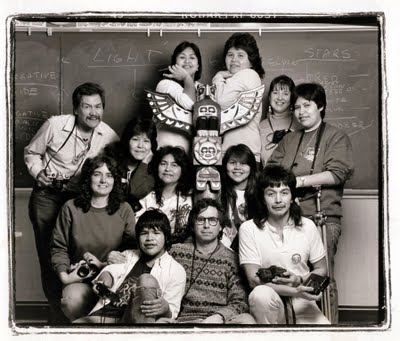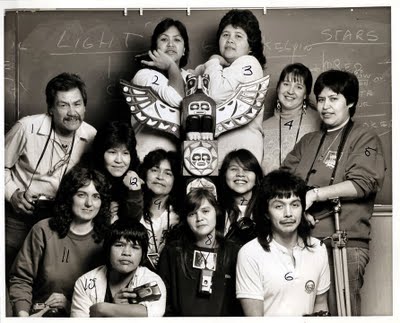Kyuquot, Essences & Plato's Cave Via Halsman, Sander & Stern
Wednesday, November 18, 2009

It was sometime in 1967 that I attended a concert of the Jefferson Airplane at Fillmore West in San Francisco. I had hair down to my shoulders but I was as straight as an arrow. It was at the concert that I first began to find connections between what I had learned from Ramón Xirau in Mexico City about philosophy and in particular about Plato in relation to the reality of everyday living. It was at this concert that I spotted a young woman sitting at a corner staring at a little cocktail glass of crème de menthe. She was staring, I quickly ascertained at the greenness of the liquid. I am sure that for her the green was to ti esti, or the equivalent in English from the Greek, that what it is. She was staring at (in her imagination) absolute green, or Plato’s idea of essence.
As I continued in my hobby of photography that year and began toying with the possibility of perhaps making money from it I had with me the inspiration of three photographers I admired. One was and is (he is very much alive) American Bert Stern. The other two were the Latvian Philippe Halsman and the German August Sander. I have always been attracted to their spare style and their respect for their subjects.
In February 1992 I traveled to the remote community of Kyuquot, BC on Vancouver Island. I had been dispatched to teach photography for a weekend to eager students who were members of the Kyuquot Native Tribe. That weekend became a blur in my memory and when I looked at the pictures of them this morning (I am writing yesterday’s blog today, Thursday, morning) all I saw were their smiles. There were lots of smiles. They were eager to learn.
Any one of those classes that I taught for the Emily Carr Outreach Program would have been a classic, “Today we are going to look at exposure and sharpness, tomorrow we will discuss the rules of composition.” Since this was before the digital revolution I took along Polaroid b+w instant 35mm slide film and a little motorized processor. My students could shoot one day and we could project the next day their results. It was fun.
Last night as I was going home from six hours of teaching The Contemporary Portrait Nude and Portraiture Through the Ages at Focal Point on 10th Avenue I was shocked to realize how teaching photography has changed (from my perspective).
In the nude class we have the most fantastic models (male and female) and we progress in how the nude has been seen not only in photography but in painting. Since our class is supposed to be contemporary we even had one segment where we bring in Yuliya a most interesting model that specializes in fetish. She holds a degree from Simon Fraser but in her spare time she sits on businessmen’s faces or presses her stiletto heels on their nether parts. The photo sessions in our class are tame by comparison but my students get to know a bit more than just the idea of a nude as simply a body sculpture and how parts of the body resemble dunes in the Sahara.
In the other class, as an example, we projected yesterday the students’ pictures of models that we dressed up (or undressed) to resemble paintings by El Greco, John Singer Sargent and photographs by Man Ray.
I finished the class by explaining that Bert Stern, in particular, had taught me (through his pictures) the idea of removing from a potential photograph all that was not necessary while retaining the essence of the person being photographed. This essence was and is that which without it the person loses his or her identity. As an example I cited Stern’s photograph of a business-suited Gary Cooper holding a Western Colt .45. The gun (and only just the gun) instantly made the man the troubled lawman of High Noon. I told my class how Halsman had almost pushed Humphrey Bogart into collapse by telling Bogart he did not want to take his picture as crook or as detective but as his essential self.
Of August Sander who reverently photographed the professions (both the elites and the poor down to the beggars) of Germany for fifty years (the first half of the 20th century) I told my class that rare in this 21st century was his ability to respect the humanity of his subjects even when his subjects were members of the Nazi Party or elements of the SS. Specially troubling but beautiful were portraits of Jews taken in the late 30s who in retrospect we know vanished soon after. For Sander the essence of his subjects was the fact that they were human.
I finished my class, not with an explanation of sharpness and exposure (I did delve on the idea of controlling contrast) but with a sketch on the board of Plato’s cave and an explanation of the chained men, unable to move from their stone bench, who saw "reality" projected (blurred and flickering like the fire between them and the opening to the cave at their back) on the wall in front of them. I told my students of the curious novel by José Saramago, La Caverna, where during the excavation of a mall in Lisbon, a cave is found with the remnants of charcoal, a stone bench and some chains…
 1. Eugene Leo
1. Eugene Leo2. Natalie Jack
3. Anita Jack
4. Kathy Williams
5. Marilyn Short
6. Robert John
7. Bonnie Jack
8. Nancy Gillette
9. Therese Smuith
10 Warren Short
11. Ruth Zand
12 Valerie Hansen
13 Velian Vincent
The smiles of my students in Kyuquot remind me of the simple and naïve world we all seemed to live in once and I now wonder how my new students will tackle the complexity of a world that seems to have forgotten the essences.
Addendum: I noticed the sweater I was wearing in the picture above. I remember that I had bought it at a discount store for under $10. It was Scottish wool and it had been knit in Scoland. Just a few weeks ago I photographed Rebecca in the fall garden with the same sweater here






